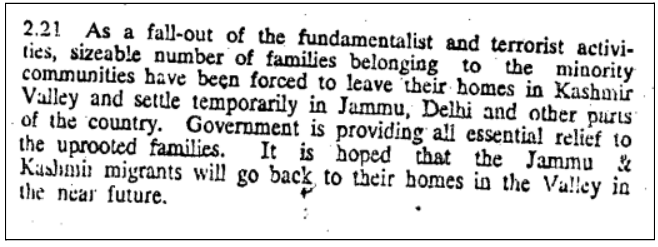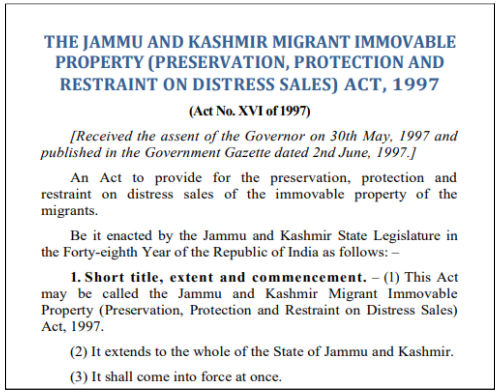The ‘Kashmir Files’ movie has once again put the spotlight on the events of 1990 and the plight of Kashmiri Pandits & other migrants. But what are the various relief & welfare measures announced for rehabilitating the migrants? Here is an explainer of all the schemes & packages announced since 1990.
The movie, ‘The Kashmir Files’, which depicts the exodus of Kashmiri Pandits from the Kashmir Valley in 1990 due to militancy and the subsequent violence, has been in the news in the last few weeks. The movie has also been a commercial success. The film also stars actor Anupam Kher, who has always been vocal about the issue of Kashmiri Pandits (KPs). The movie also found mention in the parliament discussions with a member requesting the government to make it tax-free across the country. Already, many states have made the movie tax-free. Since the release of the movie, the plight and rehabilitation of KPs has been a topic of discussion both on & off the internet. In this context, we look at the chronology of rehabilitation & welfare measures by the Government of India after the incidents of 1990 and their current status.
Violence in Kashmir resulted in the exodus of Hindus & other minorities
According to the Ministry of Home Affairs, targeted attacks by the militants against civilians in the initial phases of the terrorist violence in Jammu & Kashmir forced a vast majority of Kashmiri Pandits and a sizeable number of Sikhs and other Hindus and a few Muslims to migrate from the Valley in 1990 and thereafter. They migrated to Jammu, Delhi, and other parts of the country. Old parliamentary reports suggest that thousands of houses of the KPs were burnt down in the valley and their religious places were either burnt or demolished. Following such events, representations were made by various associations of Kashmiri Pandits for according minority status to KPs in the State of Jammu and Kashmir. Organizations and political parties also demanded that the KPs be sent back to their ancestral homes. Their rehabilitation in the valley and the creation of a separate zone for them in the valley were also demanded.

Lakhs of people were displaced from Kashmir Valley
The Norwegian Refugee Council’s Internal Displacement Monitoring Centre reported in 2010 that over 250,000 Kashmiri Pandits were displaced from the Kashmir Valley since 1990. However, the data from the Government of Jammu & Kashmir presented in the Lok Sabha in response to a question on the number of Kashmiri Pandit families who migrated from the valley since 1990 revealed that a total of 44,684 Kashmiri Migrant families were registered with the Office of the Relief and Rehabilitation Commissioner(Migrants), Jammu, comprising of 1,54,712 individuals. This data was provided in February 2022. About 90% of the registered families were Hindu Migrant Families, according to a response in the Rajya Sabha from July 2021. According to another Lok Sabha response from 2020, a total of 64,951 Kashmiri Pandit families, who left the Kashmir Valley in the 1990s were residing in Jammu (43,618), Delhi (19,338) and other states (1,995).
Relief measures to rehabilitate the Kashmiri migrants
Both the Union and State Governments have rolled out relief measures since the exodus in 1990 to support Kashmiri Migrants. The policy of the Union Government in respect of these Kashmiri migrants is aimed at facilitating the return of the migrants to the valley by creating favourable conditions for their return. The list of relief measures in the chronological order of implementation has been discussed below. These measures predominantly focus on providing cash assistance, housing, transit accommodation, and employment.
1990 – Broad Relief measures were announced
1989-90 was the period when the unrest in Kashmir was witnessed, with families being forced to leave their houses. In 1990, the Government of Jammu & Kashmir after registering Kashmiri Migrant Families provided them financial assistance of Rs. 250 per family along with free ration. This cash assistance has been enhanced from time to time. Since June 2018, the cash relief has been enhanced to Rs. 13,000 per family (Rs.3,250 per head). Monthly dry ration of 9 Kg Rice, 2 Kg Atta per head and 1 Kg Sugar per family is also being provided. For those migrants settled in Delhi, the Delhi Government is also providing cash assistance. The monthly cash relief of Rs. 3250 per person out of which the share of Delhi Government is Rs. 1000 per person.
Since 1989-90, the expenditure incurred by the Government of Jammu & Kashmir to support the state’s relief and rehabilitation of the Kashmiri migrants is reimbursed by the Government of India under Security Related Expenditure for Return & Rehabilitation (SRE).
Since March 1990, special concessions such as the option to move the family to a place of choice, mess facilities, payment of monthly pension to Pensioners of Kashmir valley, etc., were provided to the Central Government employees working in the Kashmir Valley as well as to the Kashmiri migrant employees of the Central Government and PSUs. The concessions were extended for another two years starting January 2018.
1996 – Special Package
In 1996, a special package of Rs. 6.60 crore was announced by the Prime Minister for improvement of facilities in camps in Jammu such as for the construction of one-room tenements, Sulabh type toilet complexes, drainage scheme and school buildings.
1997 – Act to prevent distress sale of property by migrants
The Jammu & Kashmir Migrant Immovable Property (Preservation, Protection & Restraint on Distress Sales) Act, 1997 was enacted by the State Government to prevent distress sale of immovable property by the migrants.

The Jammu & Kashmir Migrants (Stay of Proceedings) Act, 1997 was also enacted by the state government to stop undue harassment of migrants through the stay of legal proceedings against the migrants.
2001 – Action Plan for the return of Kashmiri Migrants
The then State Government of Jammu & Kashmir submitted an ‘Action Plan’ for the return of Kashmiri migrants in October 2000 involving a total expenditure of Rs. 2,589.73 crores. In May 2001, the Central Government gave approved the plan which involved-
- Rehabilitation grant per family- Rs. 1.50 lakhs
- Grant for the repair of houses- Rs. 1 lakh for houses intact and Rs. 3 lakhs for houses damaged
- Grant for household goods & furniture- Rs. 50,000 each
- Interest-free loan- Rs. 1-2 lakhs per person
- Compensation for loss of income from agriculture up to Rs. 1.50 lakhs per family
- An interest-free loan of Rs. 1.50 lakhs per family for investment in agricultural operations & sustenance of Rs. 2,000/- per month for one year.
2003 – Committee to address problems of Kashmiri Pandits
The then Prime Minister announced that a committee would be set up for addressing the problems of Kashmiri Pandits. He also announced the construction of 500 new tenements worth Rs.10 crores. A sanction of Rs. 5 crores for the improvement of the facilities in camps was also announced.
2004 – Prime Minister’s Reconstruction Program (PMRP)
Under Prime Minister’s Reconstruction Program (PMRP), a sanction was given for the construction of 5,248 two-room sets including allied facilities like Community Halls, Higher Secondary Schools, Prime Health Centres, Water Supply, Electric Supply, hospital, Road & Drainage, STP plant, Parks etc. It involved a budget outlay of Rs. 24,000 crores.
According to MHA, a total of 5242 two-room tenements were constructed under the Prime Minister’s Package 2004 in four different locations of Jammu and allotted to the migrants who were living in various one-room tenements, government buildings & temples, etc. 200 flats were constructed in Budgam district and allotted on a sharing basis to the migrants who joined the government service under the employment component of Prime Minister’s package -2008.
2008 – Comprehensive Package
A comprehensive package of Rs 1,618.4 crores was announced in 2008 for the return and rehabilitation of the Kashmiri Migrants for the following:
- Financial assistance for purchase/construction/repair/renovation of houses
- Construction of transit accommodation
- Continuation of Cash Relief
- Student Scholarships
- Provision of 3000 State Government jobs
- Assistance to agriculture & horticulture including waiver of interest on unpaid loans
An Apex Advisory Committee was formed in 2009 under the Chairmanship of the Revenue Minister of the erstwhile state to oversee the effective implementation of the package.
2015 – Another Package
The government of India approved another package in 2015 for providing additional 3,000 state government jobs to the Kashmiri Migrants and for constructing about 6,000 transit accommodations in the Kashmir Valley for State Government Kashmiri Migrant employees. Apart from this, the Government sanctioned Rs. 29 crores for the repair and maintenance of the assets created under the previous packages.
2021 – Launch of portal to address Grievances
The Government of Jammu & Kashmir launched portals (https://kashmirmigrantsip.jk.gov.in/ & http://www.jkmigrantrelief.nic.in/ ) to address the grievances of Kashmiri Migrants and to address the grievances related to Kashmiri migrants’ immovable properties in the Union Territory.
Status of implementation of these schemes
As mentioned earlier, a total of 6000 jobs were approved by the Government. As per a reply in the Lok Sabha from March 2019, out of the 3000 jobs approved in the 2008 package, a total of 2,905 posts were filled as of 22 February 2020. The response also revealed that 849 flats were constructed for accommodating the employees. A response in the Rajya Sabha from February 2022 revealed that the Government of Jammu and Kashmir had appointed 1,739 migrants and selected additional 1,098 migrants for the jobs announced in the 2015 package. It was also stated that the land of 610 applicants (migrants) has been restored since 2017. According to reports, the construction of all transit accommodation units is expected to be complete by 2023. Over the years, successive governments including both the UPA & NDA have announced relief packages for the welfare and to assist the return of the Kashmiri migrants. However, as the numbers show, a lot more needs to be done for a significant number of migrant families to return to the valley.
Featured Image: Rehabilitation of Kashmiri Pandits


